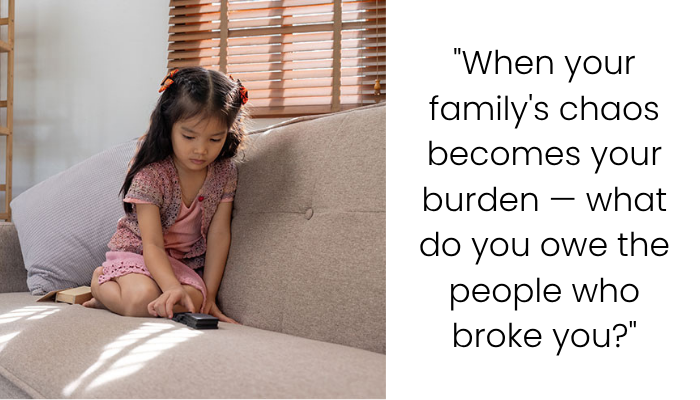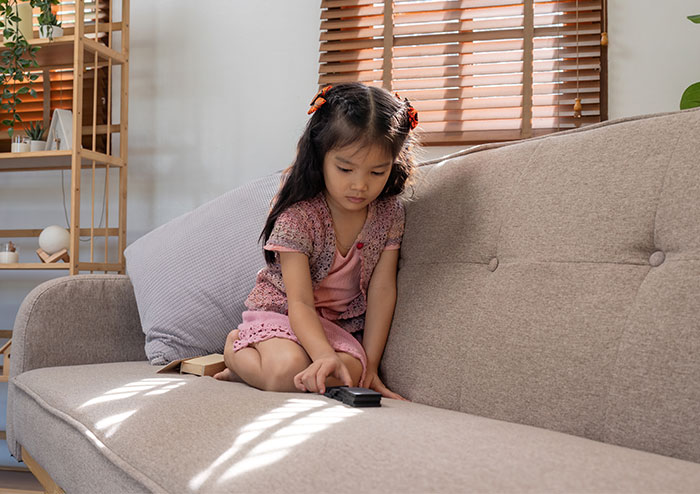I Refused to Babysit My Dad’s Stepdaughter During an Emergency — AITA for Walking Away?

The original poster (OP), a 17-year-old, shares a complex and emotionally charged situation involving their father, stepfamily, and custody arrangements. Their father, who had an affair that broke up OP’s parents’ marriage, is now remarried with two stepchildren from his wife’s previous relationships. OP harbors deep resentment toward their father and his new family, feeling coerced into spending time at their father’s house due to a strict 50/50 custody order, which will remain in place until they turn 18. They feel no familial connection or responsibility toward their father’s stepchildren and make it clear that they only attend visits because legally compelled.
The conflict arises when, during a weekend at their mother’s house, the father and his wife discover that their 5-year-old daughter was left home alone after the 14-year-old stepdaughter decided to go to a friend’s house. The parents, both at work, panicked and reached out to OP to return and watch the 5-year-old until someone could come home. OP refused, and despite numerous calls and pleas from the father and his wife, remained resolute. The fallout included guilt-tripping from the father, who framed the incident as OP abandoning a child in need. OP remains emotionally detached, stating that while they recognize the situation was unfortunate for the 5-year-old, they do not view themselves as responsible.
Advertisement – Continue Reading Below
Having a stepfamily is not something most people anticipate or plan for

Advertisement – Continue Reading Below

Advertisement – Continue Reading Below

Advertisement – Continue Reading Below

Advertisement – Continue Reading Below

Advertisement – Continue Reading Below

Advertisement – Continue Reading Below

Advertisement – Continue Reading Below

Advertisement – Continue Reading Below

Advertisement – Continue Reading Below
This story resides at the intersection of family breakdown, legal custody entanglements, and the psychological burden placed on adolescents during high-conflict parental separation. The central question—whether OP was morally obligated to intervene in an emergency despite their own trauma and emotional detachment—deserves analysis from several dimensions: legal, ethical, developmental, and familial.
Legal Considerations
From a legal standpoint, minors typically are not held responsible for the supervision of younger children unless explicitly assigned as legal guardians or caretakers. In the U.S., laws regarding child supervision vary by state, but leaving a 5-year-old unattended is generally considered neglect. However, the legal burden for that neglect would fall squarely on the parents—not an unrelated 17-year-old sibling who is not residing at the home at the time. For instance, in many jurisdictions, it is illegal to leave a child under the age of 12 unsupervised for extended periods. In this case, the legal failing is not OP’s refusal to babysit but the parents’ poor coordination and failure to ensure a safe care plan before leaving the house.
According to the U.S. Department of Health and Human Services’ Child Welfare Information Gateway, parental responsibilities do not extend to minor children unless those children are directly assigned as caregivers and are capable of performing that role. OP’s legal status as a minor, combined with their known hostility and psychological trauma regarding the family dynamic, makes it unreasonable to expect them to step in as a stand-in caregiver, especially on short notice.
Ethical Boundaries and Moral Obligation
Ethically, the situation becomes murkier. While OP is not legally responsible, some might argue that there’s a moral duty to protect a child in danger. This argument often appeals to a broader sense of communal care—regardless of personal resentment, could OP have stepped in momentarily to prevent a 5-year-old from being alone for hours?
Philosophical ethicist Peter Singer argues for a principle of minimal sacrifice: if you can prevent something bad from happening without sacrificing anything nearly as important, you ought to do it. Applied here, the question becomes: Would OP’s temporary discomfort outweigh the risk posed to the 5-year-old being left unattended?
Yet, moral philosophy must be tempered by context. OP is a victim of parental betrayal, forced into an unwanted relationship structure, and subjected to systemic legal limitations that strip them of autonomy. The emotional toll cannot be disregarded. Expecting an emotionally harmed teen to step into an adult caregiving role is ethically dubious, particularly when other adults (like the father and stepmother) had more immediate power and obligation to fix the situation. It borders on what’s known as parentification—a form of role reversal where a child is expected to meet the emotional or practical needs of adults or younger siblings.
Advertisement – Continue Reading Below
Psychological Dynamics
Family psychologists widely acknowledge the long-term emotional harm caused by parentification, especially in situations where a child is compelled to care for other children due to adult failures. This can lead to anxiety, resentment, and fractured identity development. OP’s narrative reflects textbook signs of psychological burnout, trauma linked to divorce and betrayal, and an internalization of resentment due to being forced into roles they never asked for.
According to Dr. Gregory Jurkovic, author of Lost Childhoods: The Plight of the Parentified Child, children who experience this form of forced responsibility can develop “chronic guilt” and detachment, leading to complex emotional relationships in adulthood. OP’s flat affect toward the 5-year-old’s distress may be a defense mechanism—a way of preserving their own mental stability in an environment where they have no control.
Moreover, research published in the Journal of Family Psychology (Hooper et al., 2011) found that children and teens forced into caregiving roles under duress were significantly more likely to suffer from depression and anxiety than their peers. OP’s resistance, then, could be seen not as selfishness but as self-protection against further emotional exploitation.
Custody Imbalance and Family Dysfunction
The story also underscores the dysfunction inherent in a custody system that fails to consider a teen’s emotional autonomy. OP is almost 18 and articulate about their disdain for their father and stepfamily, yet the system compels them to maintain a 50/50 schedule under threat of maternal custody loss. This rigid enforcement ignores the reality of emotional development and the right of older teens to influence their living arrangements.

Advertisement – Continue Reading Below
In family law, many states now allow “age of preference” considerations, where courts take into account the wishes of older children—typically around 14 or older—when assigning custody. If OP resides in a jurisdiction where this is ignored or underutilized, it reflects an outdated legal structure more focused on parental rights than child well-being.
Advertisement – Continue Reading Below
Furthermore, the fact that the 14-year-old stepsister deliberately left the 5-year-old alone speaks volumes about the level of dysfunction and lack of cohesion within that household. Expecting OP to serve as a glue in this fragmented environment is an unfair emotional burden.
A Compassionate but Realistic Conclusion
While the 5-year-old stepdaughter is undeniably a victim in this story—abandoned by her sister, neglected by her parents—OP is not the villain. In an ideal world, all children would look out for one another, and teens would rise above familial drama for the greater good. But in reality, teenagers are not equipped to navigate these adult failings, especially when they’ve been emotionally sidelined and legally trapped in a family they resent.
It is a tragedy that a child was left alone, but that tragedy is the result of adult irresponsibility, not teen defiance. OP’s refusal should be understood within the broader framework of self-preservation, not malice.
Advertisement – Continue Reading Below
As their story went viral, the teenager joined the discussion in its comments

Advertisement – Continue Reading Below

Advertisement – Continue Reading Below

Advertisement – Continue Reading Below

Advertisement – Continue Reading Below

Advertisement – Continue Reading Below

Advertisement – Continue Reading Below






